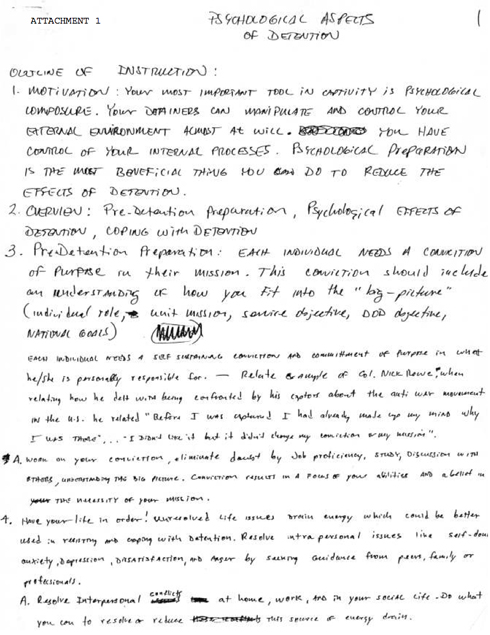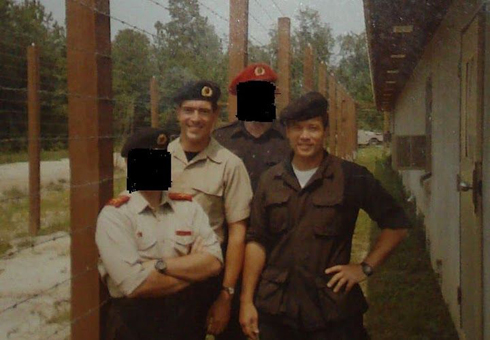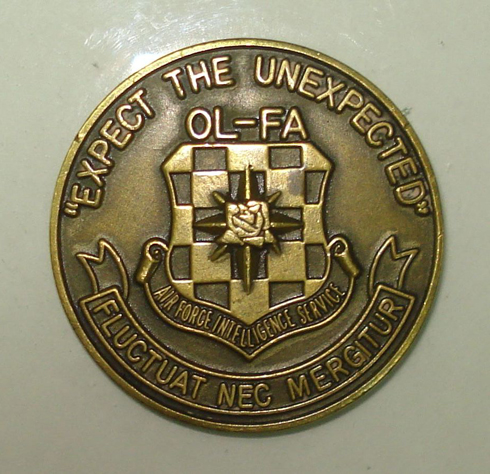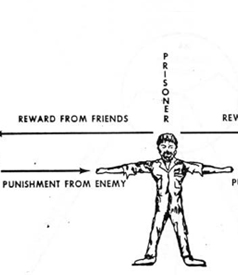Dr. Bruce Jessen's handwritten notes describe some of the torture techniques that were used to "exploit" "war on terror" detainees in custody of the CIA and Department of Defense.
Bush administration officials have long asserted that the torture techniques used on "war on terror" detainees were utilized as a last resort in an effort to gain actionable intelligence to thwart pending terrorist attacks against the United States and its interests abroad.
But the handwritten notes obtained exclusively by Truthout drafted two decades ago by Dr. John Bruce Jessen, the psychologist who was under contract to the CIA and credited as being one of the architects of the government's top-secret torture program, tell a dramatically different story about the reasons detainees were brutalized and it was not just about obtaining intelligence. Rather, as Jessen's notes explain, torture was used to "exploit" detainees, that is, to break them down physically and metnally, in order to get them to "collaborate" with government authorities. Jessen's notes emphasize how a "detainer" uses the stresses of detention to produce the appearance of compliance in a prisoner.

Click to view larger.
Indeed, a report released in 2009 by the Senate Armed Services Committee about the treatment of detainees in US custody noted that torture techniques approved by the Bush administration were based on survival training exercises US military personnel were taught by individuals like Jessen if they were captured by an enemy regime and subjected to "illegal exploitation" by their captors. The committee's report said Jessen wrote a "Draft Exploitation Plan" in April 2002 the US military used at Guantanamo and at prison facilities in Iraq and Afghanistan. Jessen also co-authored a memo in February 2002 on "Prisoner Handling Recommendations" at Guantanamo. Both of those documents remain classified.
Jessen's notes, prepared for an Air Force survival training course that he later "reverse engineered" when he helped design the Bush administration's torture program, go into far greater detail than the Armed Services Committee's report in explaining how prisoners would be broken down physically and psychologically by their captors. The notes say survival training students could "combat interrogation and torture" if they are captured by an enemy regime by undergoing intense training exercises, using "cognitive" and "exposure techniques" to develop "stress inoculation." [Click here to download a PDF file of Jessen's handwritten notes. Click here to download a zip file of Jessen's notes in typewritten form.]
The documents stand as the first piece of hard evidence to surface in nine years that further explains the psychological aspects of the Bush administration's torture program and the rationale for subjecting detainees to so-called "enhanced interrogation techniques."
Jessen's notes were provided to Truthout by retired Air Force Capt. Michael Kearns, a "master" SERE instructor and decorated veteran who has previously held high-ranking positions within the Air Force Headquarters Staff and Department of Defense (DoD).
Kearns and his boss, Roger Aldrich, the head of the Air Force Intelligence's Special Survial Training Program (SSTP), based out of Fairchild Air Force Base in Spokane, Washington, hired Jessen in May 1989. Kearns, who was head of operations at SSTP and trained thousands of service members, said Jessen was brought into the program due to an increase in the number of new SERE courses being taught and "the fact that it required psychological expertise on hand in a full-time basis."
"Special Mission Units"
Jessen, then the chief of Psychology Service at the US Air Force Survival School, immediately started to work directly with Kearns on "a new course for special mission units (SMUs), which had as its goal individual resistance to terrorist exploitation."
The course, known as SV-91, was developed for the Survival Evasion Resistance Escape (SERE) branch of the US Air Force Intelligence Agency, which acted as the Executive Agent Action Office for the Joint Chiefs of Staff. Jessen's notes formed the basis for one part of SV-91, "Psychological Aspects of Detention."

Capt. Michael Kearns (left) and Dr. Bruce Jessen at Fort Bragg's Nick Rowe SERE Training Center, 1989 (Photo courtesy of retired Air Force Capt. Michael Kearns)
Special mission units fall under the guise of the DoD's clandestine Joint Special Operations Command (JSOC) and engage in a wide-range of highly classified counterterrorist and covert operations, or "special missions," around the world, hundreds of who were personally trained by Kearns. The SV-91 course Jessen and Kearns were developing back in 1989 would later become known as "Special Survival for Special Mission Units."
Before the inception of SV-91, the primary SERE course was SV-80, or Basic Combat Survival School for Resistance to Interrogation, which is where Jessen formerly worked. When Jessen was hired to work on SV-91, the vacancy at SV-80 was filled by psychologist Dr. James Mitchell, who was also contracted by the CIA to work at the agency's top-secret black site prisons in Europe employing SERE torture techniques, including the controlled drowning method known as waterboarding, against detainees.
While they were still under contract to the CIA, the two men formed the "consulting" firm Mitchell, Jessen & Associates in March 2005. The "governing persons" of the company included Kearns' former boss, Aldrich, SERE contractor David Tate, Joseph Matarazzo, a former president of the American Psychological Association and Randall Spivey, the ex-chief of Operations, Policy and Oversight Division of JPRA.
Mitchell, Jessen & Associates' articles of incorporation have been "inactive" since October 22, 2009 and the business is now listed as "dissolved," according to Washington state's Secretary of State website.
Lifting the "Veil of Secrecy"
Kearns was one of only two officers within DoD qualified to teach all three SERE-related courses within SSTP on a worldwide basis, according to a copy of a 1989 letter written Aldrich, who nominated him officer of the year.
He said he decided to come forward because he is outraged that Jessen used their work to help design the Bush administration's torture program.
"I think it’s about time for SERE to come out from behind the veil of secrecy if we are to progress as a moral nation of laws," Kearns said during a wide-ranging interview with Truthout. "To take this survival training program and turn it into some form of nationally sanctioned, purposeful program for the extraction of information, or to apply exploitation, is in total contradiction to human morality, and defies basic logic. When I first learned about interrogation, at basic intelligence training school, I read about Hans Scharff, a Nazi interrogator who later wrote an article for Argosy Magazine titled 'Without Torture.' That's what I was taught - torture doesn't work."
What stands out in Jessen's notes is that he believed torture was often used to produce false confessions. That was the end result after one high-value detainee who was tortured in early 2002 confessed to having information proving a link between the late Iraqi dictator Saddam Hussein and al-Qaeda, according to one former Bush administration official.
It was later revealed, however, that the prisoner, Ibn al-Shaykh al-Libi, had simply provided his captors a false confession so they would stop torturing him. Jessen appeared to be concerned with protecting the US military against falling victim to this exact kind of physical and psychological pressure in a hostile detention environment, recognizing that it would lead to, among other things, false confessions.
In a paper Jessen wrote accompanying his notes, "Psychological Advances in Training to Survive Captivity, Interrogation and Torture," which was prepared for the symposium: "Advances in Clinical Psychological Support of National Security Affairs, Operational Problems in the Behavioral Sciences Course," he suggested that additional "research" should be undertaken to determine "the measurability of optimum stress levels in training students to resist captivity."
"The avenues appear inexhaustible" for further research in human exploitation, Jessen wrote.
Such "research" appears to have been the main underpinning of the Bush administration's torture program. The experimental nature of thes interrogation methods used on detainees held at Guantanamo and at CIA black site prisons have been noted by military and intelligence officials. The Armed Services Committee report cited a statement from Col. Britt Mallow, the commander of the Criminal Investigative Task Force (CITF), who noted that Guantanamo officials Maj. Gen. Mike Dunleavy and Maj. Gen. Geoffrey Miller used the term "battle lab" to describe the facility, meaning "that interrogations and other procedures there were to some degree experimental, and their lessons would benefit [the Department of Defense] in other places."
What remains a mystery is why Jessen took a defensive survival training course and assisted in turning it into an offensive torture program.
Truthout attempted to reach Jessen over the past two months for comment, but we were unable to track him down. Messages left for him at a security firm in Alexandria, Virginia he has been affiliated with were not returned and phone numbers listed for him in Spokane were disconnected.
A New Emphasis on Terrorism
SV-91 was developed to place a new emphasis on terrorism as SERE-related courses pertaining to the cold war, such as SV-83, Special Survival for Sensitive Reconnaissance Operations (SRO), whose students flew secret missions over the Soviet Union, Eastern Bloc, and other communist countries, were being scaled back.


The official patch and coin of the Special Survival Training Program. (Photo courtesy of retired Air Force Capt. Michael Kearns)
SSTP evolved into the Joint Personnel Recovery Agency (JPRA), the DoD's executive agency for SERE training, and was tapped by DoD General Counsel William "Jim" Haynes in 2002 to provide the agency with a list of interrogation techniques and the psychological impact those methods had on SERE trainees, with the aim of utilizing the same methods for use on detainees. Aldrich was working in a senior capacity at JPRA when Haynes contacted the agency to inquire about SERE.
Kearns said the value of Jessen's notes, particularly as they relate to the psychological aspects of the Bush administration's torture program, cannot be overstated.
"The Jessen notes clearly state the totality of what was being reverse-engineered - not just 'enhanced interrogation techniques,' but an entire program of exploitation of prisoners using torture as a central pillar," he said. "What I think is important to note, as an ex-SERE Resistance to Interrogation instructor, is the focus of Jessen's instruction. It is exploitation, not specifically interrogation. And this is not a picayune issue, because if one were to 'reverse-engineer' a course on resistance to exploitation then what one would get is a plan to exploit prisoners, not interrogate them. The CIA/DoD torture program appears to have the same goals as the terrorist organizations or enemy governments for which SV-91 and other SERE courses were created to defend against: the full exploitation of the prisoner in his intelligence, propaganda, or other needs held by the detaining power, such as the recruitment of informers and double agents. Those aspects of the US detainee program have not generally been discussed as part of the torture story in the American press."
Ironically, in late 2001, while the DoD started to make inquiries about adapting SERE methods for the government's interrogation program, Kearns received special permission from the US government to work as an intelligence officer for the Australian Department of Defence to teach the Australian Special Air Service (SAS) how to use SERE techniques to resist interrogation and torture if they were captured by terrorists. Australia had been a staunch supporter of the invasion of Afghanistan and sent troops there in late 2001.
Kearns, who recently waged an unsuccessful Congressional campaign in Colorado, was working on a spy novel two years ago and dug through boxes of "unclassified historical materials on intelligence" as part of his research when he happened to stumble upon Jessen's notes for SV-91. He said he was "deeply shocked and surprised to see I'd kept a copy of these handwritten notes as certainly the originals would have been destroyed (shredded)" once they were typed up and made into proper course materials.
"I hadn't seen these notes for over twenty years," he said. "However, I'll never forget that day in September 2009 when I discovered them. I instantly felt sick, and eventually vomited because I felt so badly physically and emotionally that day knowing that I worked with this person and this was the material that I believe was 'reverse-engineered' and used in part to design the torture program. When I found the Jessen papers, I made several copies and sent them to my friends as I thought this could be the smoking gun, which proves who knew what and when and possibly who sold a bag of rotten apples to the Bush administration."
Kearns was, however, aware of the role SERE played in the torture program before he found Jessen's notes, and in July 2008, he sent an email to the chairman of the Armed Services Committee, Sen. Carl Levin, who was investigating the issue and offered to share information with Levin about Jessen and the SERE program in general. The Michigan Democrat responded to Kearns saying he was "concerned about this issue" and that he "needed more information on the subject," but Levin never followed up when Kearns offered to help.
"I don't know how it went off the tracks, but the names of the people who testified at the Senate Armed Services, Senate Judiciary, and Select Intelligence committees were people I worked with, and several I supervised," Kearns said. "It makes me sick to know people who knew better allowed this to happen."
Do you like this? Click here to get Truthout stories sent to your inbox every day - free.
Levin's office did not return phone calls or emails for comment. However, the report he released in April 2009, "Inquiry Into the Treatment of Detainees in US Custody," refers to SV-91. The report includes a list of acronyms used throughout the report, one of which is "S-V91," identified as "the Department of Defense High Risk Survival Training" course. But there is no other mention throughout the report of SV-91 or the term "High Risk Survival Training," possibly due to the fact that sections of the report where it is discussed remain classified. Still, the failure by Levin and his staff to follow up with Kearns--the key military official who had retained Jessen's notes and helped develop the very course those notes were based upon that was cited in the report--suggests Levin's investigation is somewhat incomplete.
Control and Dependence
A copy of the syllabus for SV-91, obtained by Truthout from another source who requested anonymity, states that the class was created "to provide special training for selected individuals that will enable them to withstand exploitation methods in the event of capture during peacetime operations.... to cope with such exploitation and deny their detainers useable information or propaganda."
Although the syllabus focuses on propaganda and interrogation for information as the primary means of exploiting prisoners, Jessen's notes amplify what was taught to SERE students and later used against detainees captured after 9/11 . He wrote that a prisoner's captors seek to "exploit" the prisoner through control and dependence.
"From the moment you are detained (if some kind of exploitation is your Detainer's goal) everything your Detainer does will be contrived to bring about these factors: CONTROL, DEPENDENCY, COMPLIANCE AND COOPERATION," Jessen wrote. "Your detainer will work to take away your sense of control. This will be done mostly by removing external control (i.e., sleep, food, communication, personal routines etc. )…Your detainer wants you to feel 'EVERYTHING' is dependent on him, from the smallest detail, (food, sleep, human interaction), to your release or your very life … Your detainer wants you to comply with everything he wishes. He will attempt to make everything from personal comfort to your release unavoidably connected to compliance in your mind."
Jessen wrote that cooperation is the "end goal" of the detainer, who wants the detainee "to see that [the detainer] has 'total' control of you because you are completely dependent on him, and thus you must comply with his wishes. Therefore, it is absolutely inevitable that you must cooperate with him in some way (propaganda, special favors, confession, etc.)."
Jessen described the kinds of pressures that would be exerted on the prisoner to achieve this goal, including "fear of the unknown, loss of control, dehumanization, isolation," and use of sensory deprivation and sensory "flooding." He also included "physical" deprivations in his list of detainer "pressures."
"Unlike everyday experiences, however, as a detainee we could be subjected to stressors/coercive pressures which we cannot completely control," he wrote. "If these stressors are manipulated and increased against us, the cumulative effect can push us out of the optimum range of functioning. This is what the detainer wants, to get us 'off balance.'"
"The Detainer wants us to experience a loss of composure in hopes we can be manipulated into some kind of collaboration..." Jessen wrote. "This is where you are most vulnerable to exploitation. This is where you are most likely to make mistakes, show emotions, act impulsively, become discouraged, etc. You are still close enough to being intact that you would appear convincing and your behavior would appear 'uncoerced.'"
Kearns said, based on what he has read in declassified government documents and news reports about the role SERE played in the Bush administration's torture program, Jessen clearly "reverse-engieered" his lesson plan and used resistance methods to abuse "war on terror" detainees.
The SSTP course was "specifically and intentionally designed to assist American personnel held in hostile detention," Kearns said. It was "not designed for interrogation, and certainly not torture. We were not interrogators we were 'role-players' who introduced enemy exploitation techniques into survival scenarios as student learning objectives in what could be called Socratic-style dilemma settings. More specifically, resistance techniques were learned via significant emotional experiences, which were intended to inculcate long-term valid and reliable survival routines in the student's memory. The one rule we had was 'hands off.' No (human intelligence) operator could lay hands on a student in a 'role play scenario' because we knew they could never 'go there' in the real world."
But after Jessen was hired, Kearns contends, Aldrich immediately trained him to become a mock interrogator using "SERE harsh resistance to interrogation methods even though medical services officers were explicitly excluded from the 'laying on' of hands in [resistance] 'role-play' scenarios."
Aldrich, who now works with the Center for Personal Protection & Safety in Spokane, did not return calls for comment.
"Torture Paper"
The companion paper Jessen wrote included with his notes, which was also provided to Truthout by Kearns, eerily describes the same torturous interrogation methods US military personnel would face during detention that Jessen and Mitchell "reverse engineered" a little more than a decade later and that the CIA and DoD used against detainees.
Indeed, in a subsection of the paper, "Understanding the Prisoner of War Environment," Jessen notes how a prisoner will be broken down in an attempt to get him to "collaborate" with his "detainer."
"This issue of collaboration is 'the most prominent deliberately controlled force against the (prisoner of war)," Jessen wrote. "The ability of the (prisoner of war) to successfully resist collaboration and cope with the obviously severe approach-avoidance conflict is complicated in a systematic and calculated way by his captors.
"These complications include: Threats of death, physical pressures including torture which result in psychological disturbances or deterioration, inadequate diet and sanitary facilities with constant debilitation and illness, attacks on the mental health via isolation, reinforcement of anxieties, sleeplessness, stimulus deprivation or flooding, disorientation, loss of control both internal and external locus, direct and indirect attack on the (prisoner of war's) standards of honor, faith in himself, his organization, family, country, religion, or political beliefs ... Few seem to be able to hold themselves completely immune to such rigorous behavior throughout all the vicissitudes of long captivity. Confronted with these conditions, the unprepared prisoner of war experiences unmanageable levels of fear and despair."
"Specific (torture resistance) techniques," Jessen wrote, "taught to and implemented by the military member in the prisoner of war setting are classified" and were not discussed in the paper he wrote. He added, "Resistance Training students must leave training with useful resistance skills and a clear understanding that they can successfully resist captivity, interrogation or torture."
Kearns also declined to cite the specific interrogation techniques used during SERE training exercises because that information is still classified. Nor would he comment as to whether the interrogations used methods that matched or were similar to those identified in the August 2002 torture memo prepared by former Justice Department attorneys John Yoo and Jay Bybee.
However, according to the Senate Armed Services Committee report "SERE resistance training ... was used to inform" Yoo and Bybee's torture memo, specifically, nearly a dozen of the brutal techniques detainees were subjected to, which included waterboarding, sleep deprivation, painful stress positions, wall slamming and placing detainees in a confined space, such as a container, where his movement is restricted. The CIA's Office of Technical Services told Yoo and Bybee the SERE techniques used to inform the torture memo were not harmful, according to declassified government documents.
Many of the "complications," or torture techniques, Jessen wrote about, declassified government documents show, became a standard method of interrogation and torture used against all of the high-value detainees in custody of the CIA in early 2002, including Abu Zubaydah and self-professed 9/11 mastermind Khalid Sheikh Mohammed, as well as detainees held at Guantanamo and prison facilities in Iraq and Afghanistan.
The issue of "collaborating" with one's detainer, which Jessen noted was the most important in terms of controlling a prisoner, is a common theme among the stories of detainees who were tortured and later released from Guantanamo.
For example, Mamdouh Habib, an Australian citizen who was rendered to Egypt and other countries where he was tortured before being sent to Guantanamo, wrote in his memoir, "My Story: the Tale of a Terrorist Who Wasn't," after he was released without charge, that interrogators at Guantanamo "tried to make detainees mistrust one another so that they would inform on each other during interrogation."
Binyam Mohamed, am Ethiopian-born British citizen, who the US rendered to a black site prison in Morocco, said that a British intelligence informant, a person he knew and who was recurited, came to him in his Moroccan cell and told him that if he became an intelligence asset for the British, his torture, which included scalpel cuts to his penis, would end. In December 2009, British government officials released documents that show Mohamed was subjected to SERE torture techniques during his captivity in the spring of 2002.
Abdul Aziz Naji, an Algerian prisoner at Guantanamo until he was forcibly repatriated against his wishes to Algeria in July 2010, told an Algerian newspaper that "some detainees had been promised to be granted political asylum opportunity in exchange of [sic] a spying role within the detention camp."
Mohamedou Ould Salahi, whose surname is sometimes spelled "Slahi," is a Mauritanian who was tortured in Jordan and Guantanamo. Investigative journalist Andy Worthington reported that Salahi was subjected to "prolonged isolation, prolonged sleep deprivation, beatings, death threats, and threats that his mother would be brought to Guantanamo and gang-raped" unless he collaborated with his interrogators. Salahi finally decided to become an informant for the US in 2003. As a result, Salahi was allowed to live in a special fenced-in compound, with television and refrigerator, allowed to garden, write and paint, "separated from other detainees in a cocoon designed to reward and protect."
Still, despite collaborating with his detainers, the US government mounted a vigorous defense against Salahi's petition for habeas corpus. His case continues to hang in legal limbo. Salahi's fate speaks to the lesson Habib said he learned at Guantanamo: "you could never satisfy your interrogator." Habib felt informants were never released "because the Americans used them against the other detainees."
Jessen's and Mitchell's mutimillion dollar government contract was terminated by CIA Director Leon Panetta in 2009. According to an Associated Press report, the CIA agreed to pay - to the tune of $5 million - the legal bills incurred by their consulting firm.
Recently a complaint filed against Mitchell with the Texas State Board of Examiners of Psychologists by a San Antonio-based psychologist, an attorney who defended three suspected terrorists imprisoned at Guantanamo and by Zubaydah's attorney Joseph Margulies. Their complaint sought to strip Mitchell of his license to practice psychology for violating the board's rules as a result of the hands-on role he played in torturing detainees, was dismissed due to what the board said was a lack of evidence. Mitchell, who lives in Florida, is licensed in Texas. A similar complaint against Jessen may soon be filed in Idaho, where he is licensed to practice psychology.
Kearns, who took a graduate course in cognitive psychotherapy in 1988 taught by Jessen, still can't comprehend what motivated his former colleague to turn to the "dark side."
"Bruce Jessen knew better," Kearns said, who retired in 1991 and is now working on his Ph.D in educational psychology. "His duplicitous act is appalling to me and shall haunt me for the rest of my life."

This work by Truthout is licensed under a Creative Commons Attribution-Noncommercial 3.0 United States License.














